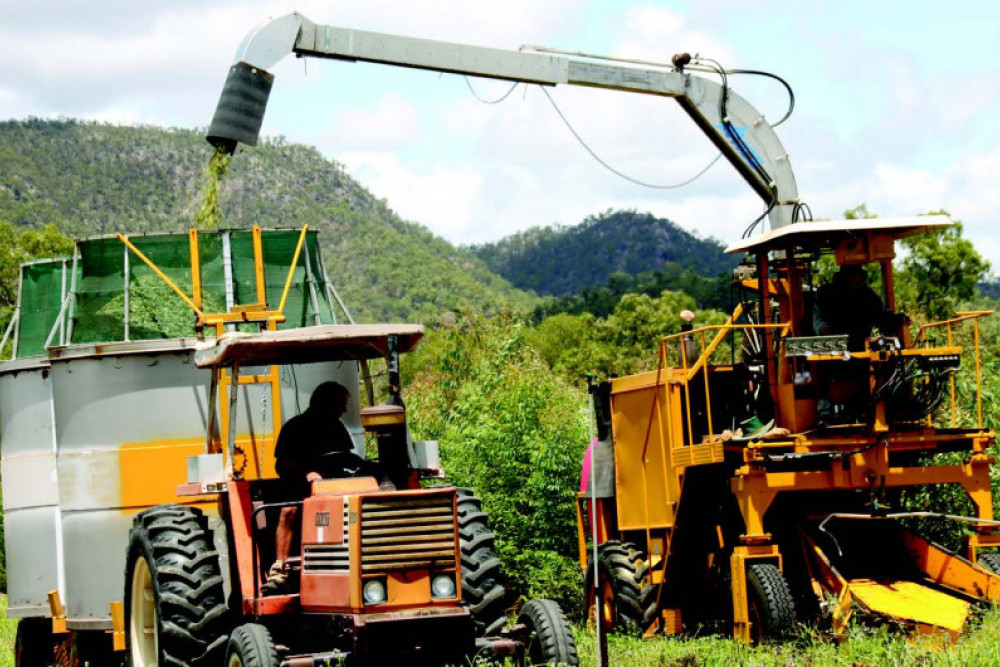On The Land
6 March, 2022
Northern natural insecticide within reach
A GROUP of Dimbulah farmers have collaborated with Melbourne company Bio-Gene Technology to develop a completely new eucalyptus-based natural insecticide, for household and farming use, that represents an annual export value of around $US600 million.

Group representative and long-term tea tree producer, Wally Dal Santo, had almost finished harvesting his trial plot of Eucalyptus cloeziana, (better known locally as Gympie Messmate or Dead Finish) and was optimistic about the project's future.
Eucalyptus cloeziana, affectionately referred to as 'cloe' by project members, is a large, native hardwood harvested commercially in Queensland, noted for its vigorous growth, durability and versatility.
But 20 years ago, a southern university entomological screening of a group of Australian eucalyptus varieties discovered a unique chemical profile in the leaves of a Gympie Messmate chemotype. The tree contained the compound tasmanone which has been identified as a successful insecticidal agent.
Not only has this study helped develop two new products, Qcide and Flavocide, suitable for use as a household spray, in malaria and dengue control or in animal and crop protection, it has uncovered the first insecticide in around a decade that has delivered a new “mode of action” (MOA).
Insecticides are organised into classes that share a common chemical structure and MOA, which is the specific action by which a product kills a pest. The alarming rate at which insects have been developing immunity to existing products, makes this addition to the small group of five functioning MOA's particularly significant.
While they are still 4-5 years away from having their products on supermarket shelves, Bio- Gene executive director of research and development Peter May said the project's hard nuts “have all been cracked” and it was now just a matter of “speeding up and tweaking the process”.
“The active ingredient in the eucalypt cultivar can vary substantially and we have been working with James Cook University scientists to identify the highest yielding trees. The pilot program has also focused on perfecting the extraction technique to maximise oil yield,” he said.
The branches of the irrigated row crop are harvested every 8-9 months and the biomass collected is placed in 2.2 tonne extraction pots where it is distilled under a pressurised dry steaming process to release the oil from the leaves.
Mr Dal Santo said he had already replaced many of the tea trees on his 122ha farm with superior varieties when Bio-Gene asked if he and his wife Maree would like to be involved in their pilot eu-calypt growing program.
The Dimbulah farmer who had grown tobacco from 1964-94 was growing a few pumpkins and mangoes and searching for a new direction, when a talk on tea trees at the Lions Club led to a seat on a New South Wales tea tree study tour.
“We came home and started harvesting tea tree seeds from the bush 12 years ago, gradually building up to our current 41ha plantation. We have been using tea tree production figures as a benchmark for the Gympie Messmate,” Mr Dal Santo said.
“We are getting around $50/kg for the tea tree oil at a 1-1.4% oil to biomass ratio, and while the eucalypt is a little harder to extract the oil from, it costs less to water and fertilise. It grows just as quickly and both species are quite pest resistant.
“I have built six new dams on the place to supplement the water supply from the channel and most of the plant nutrients are pumped out through the solid set irrigation onto the decomposed granite soil base. If the eucalypts work out as well as the tea tree, I will be happy.
“A small group of producers have been working in with us on the project and there has been a lot of interest from other farmers in the area. Tea tree mulch produced as a by-product of the distilling process has become sought after and I believe the eucalypt mulch will be every bit as good.”
While the production aspect of the operation moves steadily closer to readiness, Mr May said the regulatory pathway could take five years to navigate.
The Qcide repellent can be manufactured into an aerosol, granule or lotion form made from 85 per cent natural eucalyptus oil and other plant materials making up the remaining 15 per cent.
Bio-Gene has recently entered into an agreement with leading European and Australasian garden care company, Evergreen (formerly Scotts International), to develop natural insecticide products for Europe, the UK, New Zealand and Australia.
“The demand is there for our products, we just have to prove their safety and efficiency, register the active ingredients and construct the final formulation. It is a very exciting time for the company,” Mr May said.


